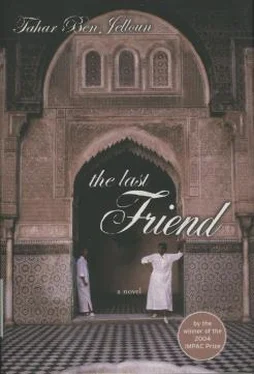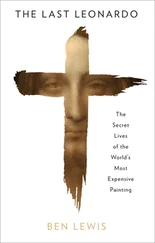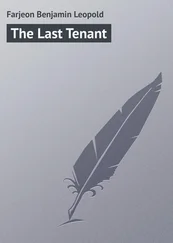Tahar ben Jelloun - The last friend
Здесь есть возможность читать онлайн «Tahar ben Jelloun - The last friend» весь текст электронной книги совершенно бесплатно (целиком полную версию без сокращений). В некоторых случаях можно слушать аудио, скачать через торрент в формате fb2 и присутствует краткое содержание. Год выпуска: 2006, Жанр: Современная проза, на английском языке. Описание произведения, (предисловие) а так же отзывы посетителей доступны на портале библиотеки ЛибКат.
- Название:The last friend
- Автор:
- Жанр:
- Год:2006
- ISBN:нет данных
- Рейтинг книги:5 / 5. Голосов: 1
-
Избранное:Добавить в избранное
- Отзывы:
-
Ваша оценка:
- 100
- 1
- 2
- 3
- 4
- 5
The last friend: краткое содержание, описание и аннотация
Предлагаем к чтению аннотацию, описание, краткое содержание или предисловие (зависит от того, что написал сам автор книги «The last friend»). Если вы не нашли необходимую информацию о книге — напишите в комментариях, мы постараемся отыскать её.
, Ben Jelloun presents a spellbinding coming-of-age story and a dazzling portrait of Morocco in an era of repression and disillusionment. In Tangiers in the late 1950s, two teenagers, Mamed and Ali, strike up an intense friendship that will last a lifetime. But lurking just beneath the surface is a deep, unspoken jealousy in danger of destroying them both.
The last friend — читать онлайн бесплатно полную книгу (весь текст) целиком
Ниже представлен текст книги, разбитый по страницам. Система сохранения места последней прочитанной страницы, позволяет с удобством читать онлайн бесплатно книгу «The last friend», без необходимости каждый раз заново искать на чём Вы остановились. Поставьте закладку, и сможете в любой момент перейти на страницу, на которой закончили чтение.
Интервал:
Закладка:
At the hospital where I was being treated, I met another Moroccan, as sick as I was. His name was Barnouss. He had removed the final "i" from his name to appear more Nordic, but with his mop of black hair and dark complexion, it would have been obvious to anyone that he was Maghrebin. He was less worried than I was, and talked to me as if we were old friends. "Here, my compatriot, I have confidence. It's important to have confidence in a country and its health system. That way, you're halfway to being cured. In Morocco, I have no confidence in the medical system. I'm sick even before I get sick. I mean, even the thought of finding myself in the hospital in Avicenne. . bacteria aren't stupid. They don't want to be treated in a Moroccan hospital. They waited until I was in Sweden to show up. Here in Stockholm I can see a doctor, any doctor, with complete confidence. You know, when I'm on vacation down there, I avoid even aspirin. The medicines there always contain less than the prescribed dosage. Watch out for anything written in Arabic. Do you think that if it says a thousand units of penicillin there really are a thousand? They put in three or four hundred and write one thousand. I have proof. At the beginning I took Moroccan drugs. There was no ef-
fect, nothing. They don't work. They are crap, you understand? Such a beautiful country, and such shitty medicine! In this magnificent country, you find real Muslims. I mean Swedes who are really Protestant or Catholic, but they treat us as if they were Muslims. They are kind and generous, with a sense of solidarity. This country deserves to be Muslim. No, I don't mean fundamentalist. That's not Islam. That's political crap. In fact, the poor Swedes are afraid that Muslim fanatics will come here and ruin their nice peaceful country, and I can understand that. Tell me, how do you feel? Here, I guarantee you, you'll get better. In this country, they don't make a distinction between rich and poor, between Swedes and immigrants; everyone is treated the same, and I admire that. I say this because some of our fellow Moroccans are never satisfied, they complain, make a lot of noise, drink, and behave badly. They don't respect this country, and that's not good!"
I liked this guy's face. He reminded me of a camel. He was tall, with long arms. For all his babbling, I had no idea what he was suffering from. He was trying to be positive, but he spouted all kinds of garbage. It's not true that the medicine is less strong than the prescription says in Morocco. These were his biases, that's all. I would have liked to have this man's energy, his faith in progress, his passion for this cold country. I had too many doubts, another characteristic I shared with my friend Ali. It was that, more than anything else, which had
brought us so close. I told myself I should stop comparing these two countries. They did not have the same history, climate, or fate. Even if Swedish medicine was remarkable, I wanted to go home to Morocco. How could I explain this need, this burning sensation, this clog that blocked everything in my chest? Before talking to Lovgren about this, or even to my wife, I called Ali. I didn't tell him I was sick; certainly not. I didn't want to worry him, to plunge him into despair. All I said was that I missed the wind from the east, I missed the dust of Tangier. He said he would send me some!
Two weeks later, two packages arrived from Ali. One was a hermetically sealed plastic bottle, labeled EAST WIND FROM TANGIER, APRIL 13, 1990. In the other was a small metal box full of gray powder: TANGIER DUST. He also sent fabric swatches for the curtains in our apartment. He continued to be busy with the decoration and remodeling. My heart was no longer in it. I needed good health, not curtains.
I continued to work, without slowing down much. I finally told my wife, who didn't say a word for twenty-four hours. She was unable to speak. She was distraught, defeated, pacing from room to room in our house. She hid, so she could cry alone. She called Dr. Lovgren, who reassured her. "We'll fight this together," he told her. She rallied. "We can't let this damn thing get the better of us, destroying our marriage and
our life together," she said. "We have the means to fight this. We will stay in this country and conquer it."
She was strong. I held her in my arms with a feeling I had never experienced before. Our love had to be stronger than the disease.
i made up my mind. Ali would know nothing about my sickness. Moreover, Ali could no longer be my friend. The knowledge would destroy him, make him suffer. I did not need his suffering. The rupture between us would surprise him, but it would hurt him less in the long run. His friendship was too precious for me to abandon it to unhappiness, despair at the mercy of the interminable process of cell destruction. One thing was certain. I would never see his tortured face approach mine for a final good-bye. I would never see those eyes, filled with tears and memories, leaving me. Above all, I would not have to read my own distress on his face, a face so transparent that it could become cruel. If I survived, I would explain everything to him. If I disappeared, he would receive a letter after I died.
I thought about telling Ramon. He was like a brother, and I always had a good time with him. I needed levity, laughter,
lightness. With Ramon, all of that was possible. Our relationship was not deep enough for him to become teary and melodramatic. I liked Ramon. He had converted to Islam for love! I had to stage a breakup with Ali, pick a fight to ruin everything. What destroys a close friendship? Betrayal. But Ali did not have a seed of treachery in him. It would be total injustice to accuse him of being a traitor. If he had it in him to betray me, he would have done so on other occasions. Breach of trust? He was incapable of that, too. I found myself walking down a boulevard under a cold sun, considering different scenarios to protect our friendship from the tragedy of death. I was torn between the idea of a complete break, with no explanation, no words, and a carefully planned argument.
I discovered within myself a capacity for perversion, a diabolical imagination and a sick pleasure in toying with the emotions of the people I loved. This distracted me. I staged my illness like a play. I was giving out parts. In the muted Scandinavian light, I was playing with peoples' lives. I was no longer a Moroccan lost in a country that was too civilized; I was no longer a doctor serving the poorest countries of the world; I was no longer the attentive and generous friend; I was in the process of extending my hand to the devil. Was I doing it out of an excess of goodness? It was more likely weakness, cruelty, selfishness. I walked along, talking to myself. No one looked at me. You can talk to yourself without
being perceived as insane. In Morocco, when people go out into the streets, screaming in distress and rending their clothes, nobody pays attention. People assume they have lost everything, except their sanity. For us, they are almost saints, touched by divine grace.
I was refining my plans when I heard a deep and serious voice. I turned around. There was no one there. The voice continued. "You are losing your mind. What is this all about, this idea of sparing your friend, but hurting him terribly? Where did you get this idea? Film noir? Or maybe that movie about jealousy in which a woman persecutes her husband even after he dies, planting evidence that he tried to killed her?" I think it was Mortal Sin with Gene Tierney. It was complicated and terrifying. "No, my friend. Worry about your illness. Take care of yourself. Get better. Let your friends comfort you; let them help you through these hard times. You have no right to be cruel to someone you love, someone with whom you have shared good times and bad. It's some kind of jealousy deep in your soul, expressing itself in a perverse, cynical way. Jealousy is human. It's unfair, but commonplace. Jealousy has nothing to do with reason. Why be jealous of Ali? What does he have that you don't? His health! The most precious of all gifts! He will survive you, he will continue to live out your friendship in sorrow. Then life will take over. He won't forget you, perhaps, but absence and silence will create an eternal distance between you. Sickness
Читать дальшеИнтервал:
Закладка:
Похожие книги на «The last friend»
Представляем Вашему вниманию похожие книги на «The last friend» списком для выбора. Мы отобрали схожую по названию и смыслу литературу в надежде предоставить читателям больше вариантов отыскать новые, интересные, ещё непрочитанные произведения.
Обсуждение, отзывы о книге «The last friend» и просто собственные мнения читателей. Оставьте ваши комментарии, напишите, что Вы думаете о произведении, его смысле или главных героях. Укажите что конкретно понравилось, а что нет, и почему Вы так считаете.












